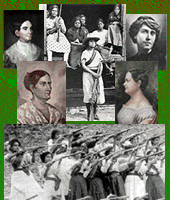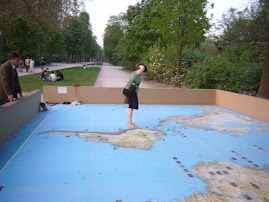El post del viernes con mensaje (positivo)... a ver si se cumple :)
vendredi 31 août 2007
mardi 28 août 2007
Despedida "Bruxellois"
Aunque este Blog está tomando un camino más “político” y “articulero” no deja de ser personal, y no como no podía ser de otra manera, después de nuestro “brunch Bruxellois” de despedida tenía que dedicarte un post con una canción…
Porque has sido alguien muy importante en estos cinco meses de mi Stage,
Porque me has animado a continuar con mi blog (y parece que me está gustando),
Porque me has ayudado a seguir mostrándome tal y como soy,
Porque nos has ayudado a tod@s para estar siempre “conectados”
Y por ello hemos disfrutado de muy buenos momentos,
Porque nos has dedicado los mejores momentos del Stage hasta en un video,
Porque has sido un regalo del destino con el que he paseado y compartido muchas puestas de sol,
Porque volverás a tu Granada querida y seguirás llevando ese buen “rollito” que te caracteriza,
Porque han sido muchas las cosas que hemos compartido, que me has enseñado, y espero haber aprendido…
Me ha costado mucho seleccionar la canción porque tenía que tener todos los ingredientes de despedida, pena, nostalgia, como no internacional, pero sin ser demasiado pasteloso, además de sumar nuestras dos personalidades y eso si que es difícil!!!
Después de descartar “ne me quitte pas-Jaques Brel”, “tu me manques” “Miss you-Rolling Stones” y otras muchas…
Este es el resultado de una canción con carácter (como yo :) ), de una de mis cantantes favoritas, con sensibilidad (como tú :)) y con una letra preciosa –aunque en este caso sabemos que sólo se aplica en alguna estrofa.
No cambies, eres alguien muy especial y ojala que volvamos a encontrarnos en este camino del destino.
El video se ha colado arriba...
Porque has sido alguien muy importante en estos cinco meses de mi Stage,
Porque me has animado a continuar con mi blog (y parece que me está gustando),
Porque me has ayudado a seguir mostrándome tal y como soy,
Porque nos has ayudado a tod@s para estar siempre “conectados”
Y por ello hemos disfrutado de muy buenos momentos,
Porque nos has dedicado los mejores momentos del Stage hasta en un video,
Porque has sido un regalo del destino con el que he paseado y compartido muchas puestas de sol,
Porque volverás a tu Granada querida y seguirás llevando ese buen “rollito” que te caracteriza,
Porque han sido muchas las cosas que hemos compartido, que me has enseñado, y espero haber aprendido…
Me ha costado mucho seleccionar la canción porque tenía que tener todos los ingredientes de despedida, pena, nostalgia, como no internacional, pero sin ser demasiado pasteloso, además de sumar nuestras dos personalidades y eso si que es difícil!!!
Después de descartar “ne me quitte pas-Jaques Brel”, “tu me manques” “Miss you-Rolling Stones” y otras muchas…
Este es el resultado de una canción con carácter (como yo :) ), de una de mis cantantes favoritas, con sensibilidad (como tú :)) y con una letra preciosa –aunque en este caso sabemos que sólo se aplica en alguna estrofa.
No cambies, eres alguien muy especial y ojala que volvamos a encontrarnos en este camino del destino.
El video se ha colado arriba...
vendredi 24 août 2007
jeudi 23 août 2007
Commission acts to bridge gender pay gap
Across the EU economy, women continue to earn an average of 15% less than men, according to the European Commission. A new report released today sets out ways the EU can bridge the gap – which has barely changed over the past decade. The gender pay gap represents the difference between average hourly pay for women and men before tax across the economy as a whole. It reflects ongoing discrimination and inequality in the labour market which, in practice, mainly affects women.
"Girls out-perform boys at school and more women enter the labour market with a university degree than men, but a pay gap of 15% persists. This is an absurd situation and needs to change," said Vladimír Špidla, EU Commissioner for Employment, Social Affairs and Equal Opportunities. "The pay gap is a complex issue with multiple causes. Sometimes we see pure discrimination. But often reasons are hidden: women do more unpaid work, like taking care of the household and dependants; more women work part time and often the women-dominated sectors are on a lower pay scale. We must shift up a gear now. The only way to succeed is by getting men and women, NGOs, social partners and governments on board to tackle the problem at all levels".
The gender pay gap extends well beyond the question of equal pay for equal work. One of the main causes is the way women's competences are valued compared to men's. Jobs requiring similar qualifications or experience tend to be paid less when they are dominated by women than by men. For example, in some countries nannies earn less than car mechanics, supermarket cashiers less than warehouse workers, nurses less than the police.
The pay gap also reflects inequalities on the labour market mainly affecting women - in particular the difficulties in reconciling work with private life. Women have greater recourse to part-time work and more frequent career breaks, which negatively impact on their professional development. They still lag behind when it comes to holding managerial positions and they encounter more obstacles and resistance as they proceed along their career paths. As a consequence, women's career paths are more often interrupted, slower and shorter, and hence less well paid than men's. Statistics show that the pay gap grows with age, education and years of service – differences in pay are over 30% in the 50-59 age group and 7% for the under-30s; it is over 30% for those with third-level education and 13% among those with lower level secondary education and for workers with over 30 years of service in a company it is as high as 32%, while it is 10% lower (22%) for those who have worked in a company for one to five years.
To tackle the issue, today's Communication identifies four fields of action:
Ensuring better application of existing legislation (analysing how current laws could be adapted and raising awareness);
Fighting the pay gap as an integral part of Member States' employment policies (exploiting full potential of EU funding, in particular the European Social Fund);
Promoting equal pay among employers, especially through social responsibility;
Supporting exchange of good practices across the EU and involving the social partners.
Closing the gender gap is one of the key concerns highlighted in the 'Roadmap for equality between women and men 2006-2010'. In addition, a Eurobarometer survey from January 2007 showed that a large majority of Europeans believe that more women are needed in management positions (77%) and as Members of Parliament (72%). 68% of Europeans believe family responsibilities act as an obstacle for women in accessing management positions and 47% consider women are less likely to be promoted than men with the same qualifications. Today's Communication aims to analyse the causes of the pay gap and identify courses of action at EU level. It highlights that the pay gap can only be tackled by acting at all levels, involving all stakeholders and focusing on all the factors that cause it.
For more information:
Link to communicationhttp://ec.europa.eu/employment_social/news/2007/jul/genderpaygap_en.pdf
Gender equality policy
http://ec.europa.eu/employment_social/gender_equality
Study on 'The gender pay gap: origins and policy responses'
http://ec.europa.eu/employment_social/publications/2006/ke7606200_en.pdf
European Year of Equal Opportunities for All
http://equality2007.europa.eu
Fourth European Working conditions survey:
http://www.eurofound.europa.eu/ewco/surveys/EWCS2005/index.htm
"Girls out-perform boys at school and more women enter the labour market with a university degree than men, but a pay gap of 15% persists. This is an absurd situation and needs to change," said Vladimír Špidla, EU Commissioner for Employment, Social Affairs and Equal Opportunities. "The pay gap is a complex issue with multiple causes. Sometimes we see pure discrimination. But often reasons are hidden: women do more unpaid work, like taking care of the household and dependants; more women work part time and often the women-dominated sectors are on a lower pay scale. We must shift up a gear now. The only way to succeed is by getting men and women, NGOs, social partners and governments on board to tackle the problem at all levels".
The gender pay gap extends well beyond the question of equal pay for equal work. One of the main causes is the way women's competences are valued compared to men's. Jobs requiring similar qualifications or experience tend to be paid less when they are dominated by women than by men. For example, in some countries nannies earn less than car mechanics, supermarket cashiers less than warehouse workers, nurses less than the police.
The pay gap also reflects inequalities on the labour market mainly affecting women - in particular the difficulties in reconciling work with private life. Women have greater recourse to part-time work and more frequent career breaks, which negatively impact on their professional development. They still lag behind when it comes to holding managerial positions and they encounter more obstacles and resistance as they proceed along their career paths. As a consequence, women's career paths are more often interrupted, slower and shorter, and hence less well paid than men's. Statistics show that the pay gap grows with age, education and years of service – differences in pay are over 30% in the 50-59 age group and 7% for the under-30s; it is over 30% for those with third-level education and 13% among those with lower level secondary education and for workers with over 30 years of service in a company it is as high as 32%, while it is 10% lower (22%) for those who have worked in a company for one to five years.
To tackle the issue, today's Communication identifies four fields of action:
Ensuring better application of existing legislation (analysing how current laws could be adapted and raising awareness);
Fighting the pay gap as an integral part of Member States' employment policies (exploiting full potential of EU funding, in particular the European Social Fund);
Promoting equal pay among employers, especially through social responsibility;
Supporting exchange of good practices across the EU and involving the social partners.
Closing the gender gap is one of the key concerns highlighted in the 'Roadmap for equality between women and men 2006-2010'. In addition, a Eurobarometer survey from January 2007 showed that a large majority of Europeans believe that more women are needed in management positions (77%) and as Members of Parliament (72%). 68% of Europeans believe family responsibilities act as an obstacle for women in accessing management positions and 47% consider women are less likely to be promoted than men with the same qualifications. Today's Communication aims to analyse the causes of the pay gap and identify courses of action at EU level. It highlights that the pay gap can only be tackled by acting at all levels, involving all stakeholders and focusing on all the factors that cause it.
For more information:
Link to communicationhttp://ec.europa.eu/employment_social/news/2007/jul/genderpaygap_en.pdf
Gender equality policy
http://ec.europa.eu/employment_social/gender_equality
Study on 'The gender pay gap: origins and policy responses'
http://ec.europa.eu/employment_social/publications/2006/ke7606200_en.pdf
European Year of Equal Opportunities for All
http://equality2007.europa.eu
Fourth European Working conditions survey:
http://www.eurofound.europa.eu/ewco/surveys/EWCS2005/index.htm
Inscription à :
Articles (Atom)









.jpg)


